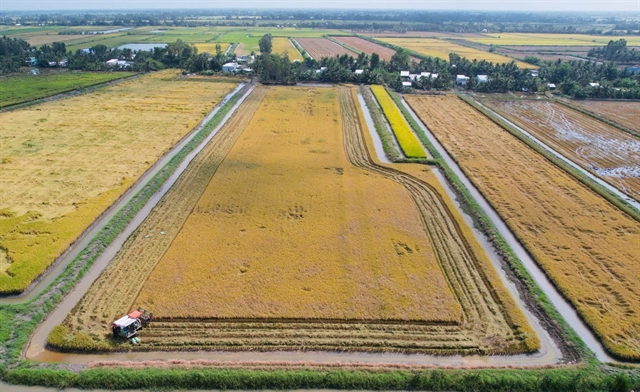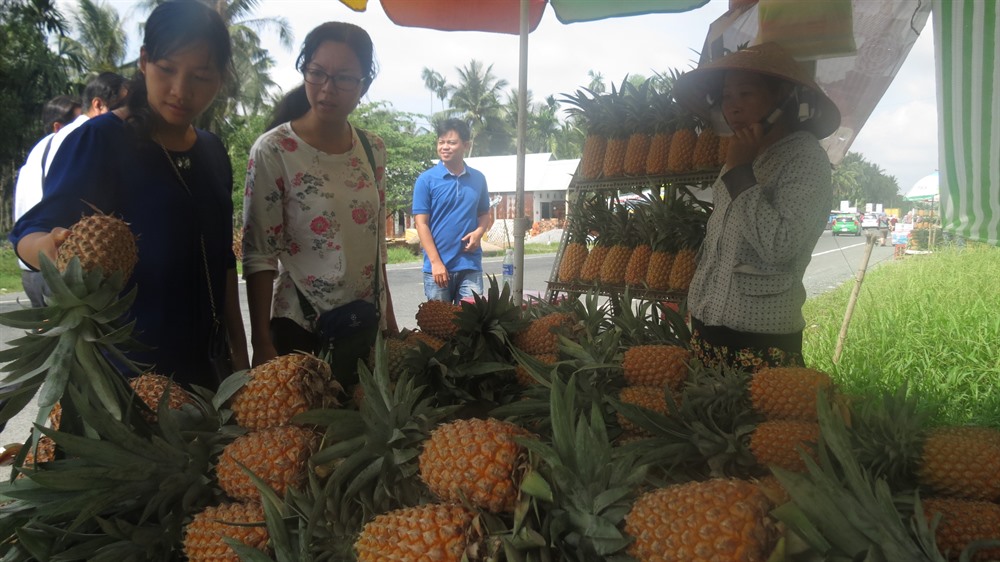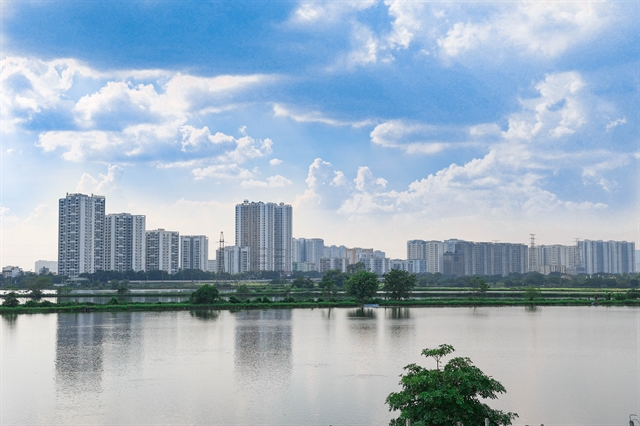 Society
Society

Deputy Prime Minister Vương Đình Huệ has called on Hậu Giang Province to make more efforts to become one of the leading localities in the Cửu Long (Mekong) Delta region in the next five years.
 |
| Cầu Đúc pineapple is a famous specialty fruit in Hậu Giang Province. — VNS Photo Gia Lộc |
HẬU GIANG — Deputy Prime Minister Vương Đình Huệ has called on Hậu Giang Province to make more efforts to become one of the leading localities in the Cửu Long (Mekong) Delta region in the next five years.
It needs to overcome obstacles to boost its socio-economic development, he told a meeting with the province’s leaders on Monday.
The province has many concentrated planting areas for rice, sugarcane, pineapple, and other fruit trees using hi-tech farming methods.
But it suffers from low per capita income, high share of agriculture in the economy and a low rate of new enterprises being set up.
Huệ said the province should pay more attention to rice production, strengthen the fight against African swine fever, prevent erosion of river banks and saltwater intrusion, build dams to keep out saltwater, and remove difficulties faced by businesses.
Lê Tiến Châu, chairman of the province People’s Committee, said in the first three months of this year, the province’s public spending has been worth nearly VNĐ3 trillion (US$129 million), 6.3 per cent up from the same period last year, and revenues were VNĐ1.5 trillion ($64.7 million).
It has actively implemented measures for fire safety and preventing riverbank erosion and saltwater intrusion, he said.
He called on the Government to allocate funds for upgrading the National Highway 61B section from the Vĩnh Tường crossroads to Long Mỹ town, approve the increase in the charter capital of the Investment and Development Fund, establish credit guarantee funds for small and medium enterprises, and provide VNĐ100 billion ($4.3 million) to the province from the Central Enterprise Arrangement Support Fund.
He asked for permission to convert the Lung Ngọc Hoàng Nature Reserve’s special use forest into a production forest and approval for three projects added to the list of Mekong Delta regional connectivity projects and a project to grow pineapple in Hậu Giang and three other delta provinces by 2025.
It also needs around VNĐ50 billion ($2.16 million) to build a high-tech agricultural zone, he said.
Huệ said the Government would consider urgent proposals like building a road linking three communes with the rest of the province, works to respond to natural disasters and promoting regional connectivity.
Climate change adaptation
During the dry season Hậu Giang authorities regularly disseminate information on saltwater intrusion in estuaries so that decisions can be made quickly to help farmers adapt to unpredictable weather conditions.
The province’s Long Mỹ District is a saltwater intrusion hotspot during the dry season.
In its Lương Nghĩa and Vĩnh Viễn A communes, salinity levels have been measured at 12 per cent, but local farmers have adapted.
Tư Cường of Lương Nghĩa has dug ditches around his house to store freshwater for household use and irrigating his fruit trees.
Lê Văn Phước, the district Party Secretary, is going around with local agricultural officials to households to tell people to store freshwater.
He tells them to use lu and kiệu, traditional storage tanks in the region, to store freshwater.
He is now reassured after locals have planted 400ha of pineapple, a crop that is highly resistant to climate change impacts.
“Saltwater intrusion could help improve the quality of pineapple by making it more flavourful,” he said.
The province has invited scientists from Cần Thơ University to help farmers growing the renowned Cầu Đúc pineapple improve their planting techniques to ensure they are resistant to diseases.
Cầu Đúc pineapples are grown mostly in Long Mỹ District and Vị Thanh city on a total area of 35ha, and annual output is around 36 tonnes.
The province has allocated over VNĐ84 billion ($3.6 million) to building dykes and dredging rivers to enable freshwater storage.
A 32.5km dyke system with 38 sluices has been built between Long Mỹ District and Vị Thanh city to prevent saltwater intrusion.
The province is one of the first localities in the delta to build freshwater reservoirs, and has earmarked VNĐ165 billion ($7.1 million) for it.
It is introducing many models to grow pomelo, pepper and cajuput and breed ducks, helping farmers adapt to climate change.
Châu said it is essential to help farmers access appropriate solutions to develop high-tech agricultural models by adopting industry 4.0 technologies.
“Farmers and co-operatives can get support from scientists, institutes, schools, and businesses.”
Smart and advanced technologies have been applied to farming thác lác fish, pineapple, seedless lemon, soursop, honeydew melon, and dragon fruit.
The province has adopted solutions such as developing a digital map of salinity areas, surveying and evaluating the hydrology and sediment regime, topographic features and geology in its main rivers and canals that face the risk of imminent collapse, and building a database and a model to issue landslide warnings.
It plans to expand and upgrade its network of automatic air and water monitoring stations. — VNS




